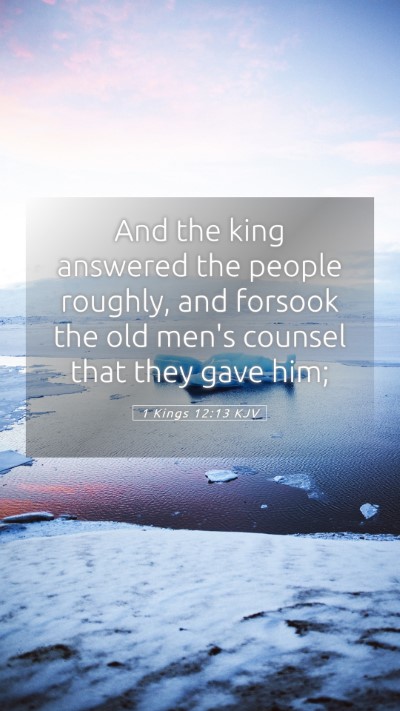Bible Verse Meaning for 1 Kings 12:13
1 Kings 12:13 states: "And the king answered the people roughly, and forsook the old men's counsel that they gave him; and spake to them after the counsel of the young men, saying, My father made your yoke heavy, and I will add to your yoke: my father chastised you with whips, but I will chastise you with scorpions." This pivotal verse presents a crucial moment in the life of King Rehoboam as he makes a choice that would ultimately lead to a division in Israel.
Summary of Interpretations
The verse can be understood through various lenses, offering insights into the implications of leadership, wisdom, and the consequences of rejecting sound counsel. The responses from public domain commentators provide a comprehensive understanding:
-
Matthew Henry's Commentary:
Henry points out that Rehoboam's harsh response to the people indicated his lack of wisdom and compassion. He highlights that forsaking the advice of older, experienced men in favor of the young advisors reflected a misguided confidence while revealing Rehoboam's immaturity in leadership. The choice to speak roughly aligns with a theme of misguided strength and a failure to unify the kingdom.
-
Albert Barnes' Notes on the Bible:
Barnes elaborates on the significance of Rehoboam's decision to follow the counsel of the young men who encouraged an oppressive stance. He notes that this demonstrates how sometimes youthful exuberance can lead to a lack of foresight and understanding of the repercussions of one's actions. The analogy of 'whips' and 'scorpions' serves as a metaphorical representation of the harsh treatment the people would endure under his reign.
-
Adam Clarke's Commentary:
Clarke emphasizes the psychological and political ramifications of Rehoboam's words. He argues that such a statement would serve to alienate the kingdom rather than draw it together. The use of the term 'scorpions' implies an increase in punishment beyond what was customary, suggesting a tyrannical approach that contrasts the legacy of Solomon’s reign.
Contextual Analysis
To fully grasp this verse, it is essential to consider the historical context surrounding it. Rehoboam, the son of Solomon, inherited a divided kingdom after the reign of his father. The request for lighter burdens from the people suggests a desire for humane leadership in stark contrast to the policies of his father, which had been characterized by grandeur and heavy taxation.
Key Themes and Lessons
- Leadership and Responsibility:
Rehoboam’s decisions serve as a warning about the importance of wise counsel in leadership. The scriptures teach that a leader must be open to guidance and understanding the needs of those they govern.
- Consequences of Harsh Rule:
The ultimatum posed by Rehoboam serves to remind readers that oppressive governance often leads to rebellion and division among people. A ruler who lacks empathy for the populace invites strife.
- Generational Wisdom:
The rejection of older men's advice illustrates the tension between generational perspectives. It proposes a critical discussion on the value of wisdom acquired through experience compared to the impulsiveness of youth.
Application of the Verse
Understanding 1 Kings 12:13 can be pivotal for individuals today—especially in contexts involving leadership and interpersonal relationships. The call for compassion and service in authority roles is paramount:
- In Bible study groups, this verse could spark discussions on how to exercise authority in personal and community situations.
- Through online Bible study platforms, individuals can share insights on interpreting difficult Bible passages, such as the consequences of choices made by leaders.
- In Bible study lessons, examining the character dynamics at play can foster deeper understanding of human behavior and relationships.
Cross References
To gain further insight, consider exploring these related verses:
- Proverbs 11:14 - Highlights the importance of wise counsel.
- 1 Kings 12:1-5 - Provides further context regarding the people's request and Rehoboam's initial reception.
- 2 Chronicles 10:10 - Offers a parallel account of Rehoboam's response to the people.
Conclusion
In conclusion, 1 Kings 12:13 serves as a powerful reminder of the significant effects that leadership choices can have on communities and relationships. Through the combined insights of Matthew Henry, Albert Barnes, and Adam Clarke, we learn the necessity of wisdom, compassion, and the dangers of harsh authority. For those seeking an understanding of scripture, this verse and its commentary provide valuable lessons applicable to both historical contexts and contemporary life.


